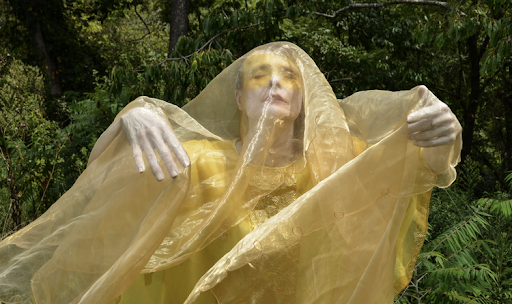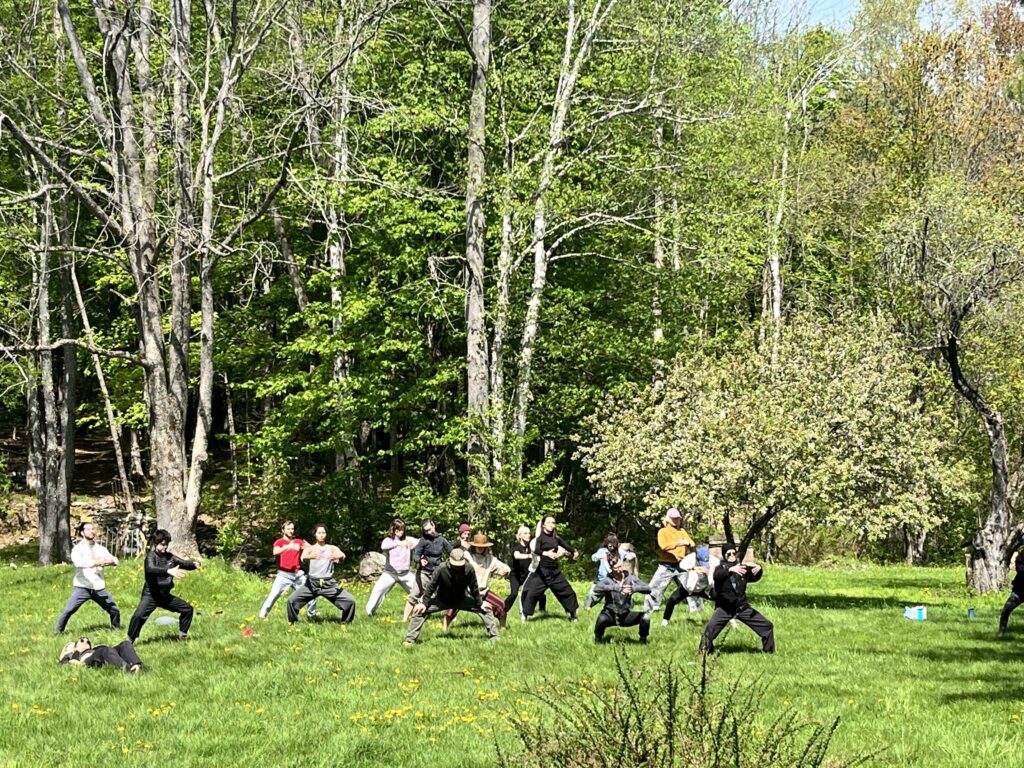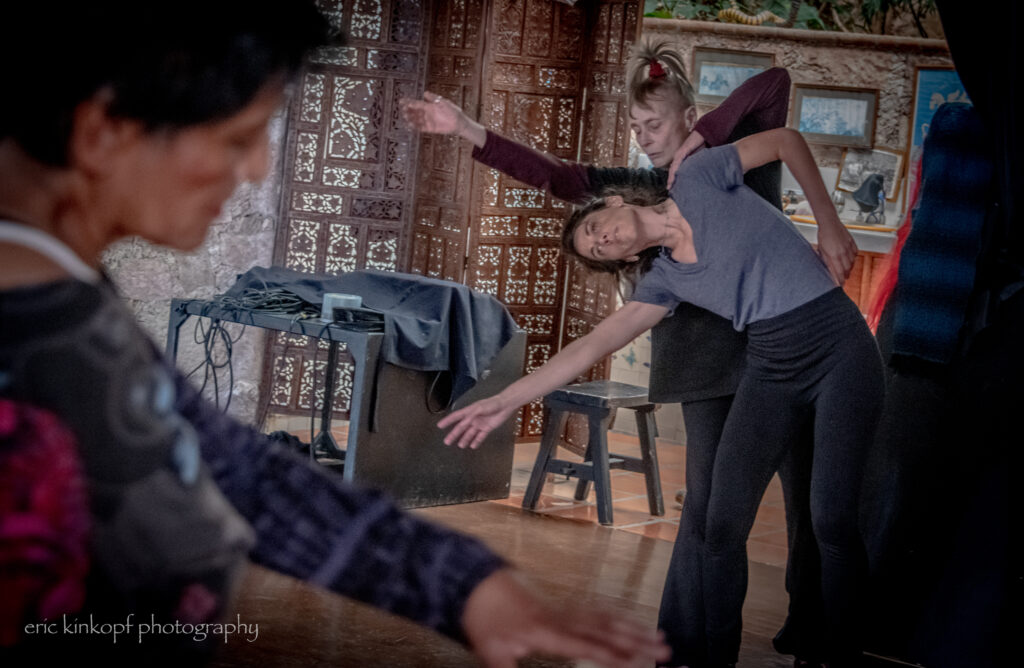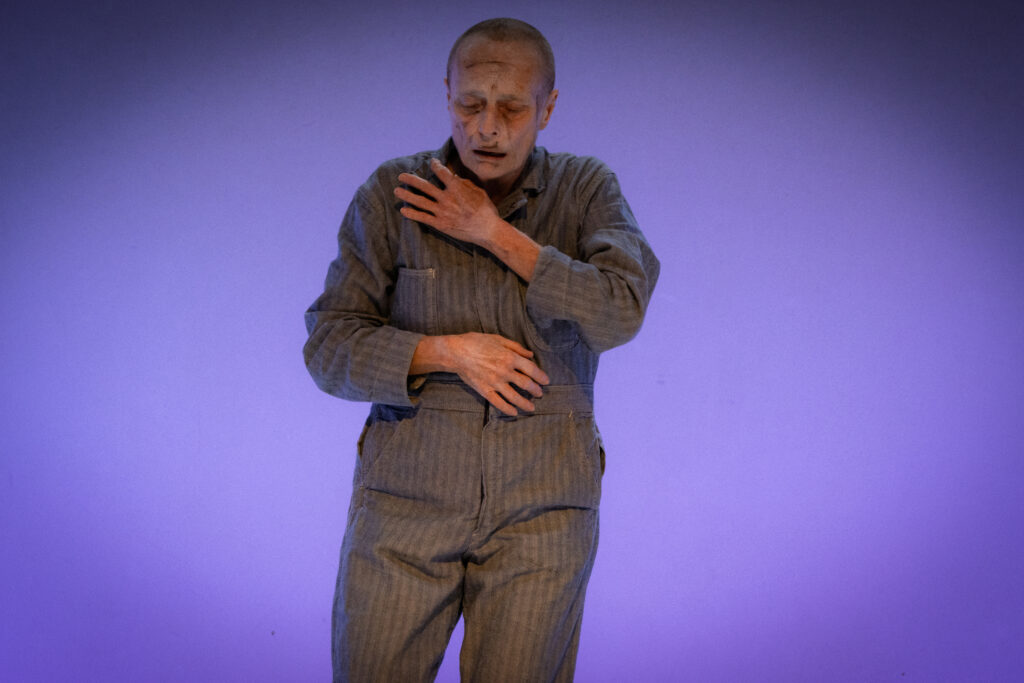
Description of the Indescribable Butoh
Originating in post-WWII Japan, butoh is a potent and revolutionary dance form. Butoh uses the body brazenly as a battleground to attain personal, social, or political transformation. In its early forms, butoh embraced and referenced Western artistic movements: German Expressionism, Dadaism, Surrealism, Existentialism, and Fluxus, all of which pervaded the Tokyo underground and the avant-garde art scene at that time.
The co-founders of butoh, Tatsumi Hijikata, and Kazuo Ohno trained in German Modern dance, which was integral to the development of German Expressionism. But, eventually, they took opposite approaches to their dance-making. Hijikata’s work became known as ankoku butoh (dance of utter darkness); he embraced the grotesque and the absurd, exploring themes of sacrifice, struggle, and death. Ohno’s butoh was playful, humorous, and filled with light and life. Today’s butoh is influenced by both Hijikata and Ohno and wrestles to balance those contrary approaches.
Like many other Japanese concepts, butoh is defined by its very evasion of definition. It is both theatre and dance, yet it follows no choreographic conventions. It is a subversive force, through which traditions are overturned. As such, it must exist somewhere on the social periphery. It is a popular spectacle, unlike the classical theatre of Noh with its elaborate gestures. Yet it is esoteric. It is a force of liberation, especially within the conformist Japanese social structure, yet it is born out of extreme discipline. In a culture of exceptional visual harmony, it employs a vocabulary of ugliness.
Workshop Description
During the workshop, participants will investigate the anatomical possibilities of their natural, everyday bodies, including floating, hanging, and various qualities of movement or stillness. Exercises from Noguchi Taiso water body practice and each of the “13 Aspects of Butoh” (see below) will help remove customary societal and cultural behaviors, guiding dancers toward bodily emptiness, a pre-expressive state. Without the constraints of old habits, the unconscious body can freely respond to its sensations, forces, and emotions, to become the fully expressive body. Dancers will be instructed with lessons from all 13 Aspects of Butoh, to expand their range of movements, including the subtle body, the avant-garde body, the fading body, the animal body, and the unleashed body.
Arrival, Onsite Check-In, Opening Circle and COVID testing
- Arrival/Onsite Check-In: Participants will from 4:00pm-7:00pm on Thursday, September 12th, 2024. Dinner from 6-7pm.
- Opening Circle: Friday, September 13th at 10 am. All participants are asked to attend.
- Closing Circle: Sunday, September 15th at 12:30pm. Lunch 1-2pm.
- Final Group Clean: Sunday, September 15th from 2-3pm
- Departure: Sunday, September 15th by 3pm.
Noguchi Taiso
“The materials that constitute our body are undoubtedly of this Earth and have participated in and experienced the creation process of the Earth. Therefore our body, living here and now, includes the entire history of the Earth. What is called “live”, “body” and “mind” indicates the phases of change and flow of the Earth. There is no absolute standard for all things. Every standard comes into being within ourselves, freshly, here and now, through relationships. Awareness of these relationships allows you to truly become one with original nature itself. You develop a clearer understanding of how your mind/body operates and a greater appreciation of the involvement of your thought process in all your physical acts.” – Michizo Noguchi, founder of Noguchi Taiso
Noguchi proposes that natural effort-free movement does not fight gravity but embraces it, using its force to assist the movement. A main principle of Noguchi Taiso is movement as a reaction. Instead of moving intentionally, the practitioner creates the conditions for the movement to arise as a natural response. Noguchi Taiso has been adopted by many butoh, dance, and theatre practitioners in Japan, especially for its ability to empty the body of various learned, superficial, and culturally derived behavior patterns, making it more transparent, and aligning it with the universal forces at play.
13 Aspects of Butoh
“13 Aspects of Butoh” is an ongoing research project designed by Julie Becton Gillum in order to discover the essential nature of butoh and how it differs from other dance and theater forms. Gillum has been creating and sharing workshops based on her personal research since 2010. Some of the “Aspects: such as “Space”, “Time” and “Force” are basic to all forms of dance. However some aspects are more specific to butoh and Japanese aesthetics, such as: “Ma,” “Jo-ha-kyu,” “Ghost of Self”, “Dance Like a Child,” “Every Dance is a Prayer,” “Masculine and Feminine.” Many of the “Aspects” began as quotes from my butoh mentors during training sessions. It is these, more obscure body concepts, that we will delve deeply into during our training at Earthdance. Transformation, interior and exterior space, sensation and presence will be at the core of our butoh investigations. I will explain the concepts of “Ma” and “Jo-ha-kyû” to give examples as to how they will be used in the workshop.
Guided explorations of concepts such as “ma” and “Jo-ha-kyû”encourage students to examine Japanese aesthetic principles through experience with movement timing, phrasing and forming.
Dancers, actors, martial artists, yoga practitioners and anyone interested in exploring their own personal capacity for movement expression is welcome to join Butoh and Noguchi Taiso Training. This training is appropriate for all levels.
Learn about the 13 Aspects of Butoh here.

Our Fees Explained
Earthdance offers a sliding scale payment for participation in this event, please take a moment to reflect as you decide on where you best fit.
Your level of contribution is self selected and does not need to be advocated for. However, we invite you to remember this contribution is currency and we ask that you stretch where you are able so that those who cannot stretch as far of a financial distance may also have potential access to community events. As you choose your rate please consider the following factors:
- Your access to income and wealth, as connected to family and partnership, both currently and anticipated in the future.
- The historical, systemic impacts of wealth accrual based on culture, race and other intersection marginalizations for you and your family.
- The regional ease of your attendance, while some community members can drive to Earthdance, others will need to consider tuition based on their ability to travel longer distances.
- Earthdance is a community and rental funded organization which recently, historically and uniquely through the Covid-19 pandemic has struggled to have viable income.
PRICING
GRATITUDE LODGE
$700 – Financially Wealthy
$575 – Financially Abundant
$475 – Financially Stable
$400 – Financially Coping
$350 – Financially Strained
CAMPING
$675 – Financially Wealthy
$550 – Financially Abundant
$450 – Financially Stable
$375 – Financially Coping
$325 – Financially Strained
COMMUTER
$650 – Financially Wealthy
$525 – Financially Abundant
$425 – Financially Stable
$350 – Financially Coping
$300 – Financially Strained
Equity & Access Tickets
Although we’re not able to offer any full scholarships this year, we’re excited to offer up to 3 FULL JAM Equity & Access Discounts to individuals who feel part of an underrepresented and/or marginalized group. We know that for those who come from marginalized populations showing up to spaces filled with primarily privileged groups can be a challenge, and can feel vulnerable.
APPLY HERE! Application deadline is August 29th.
For those who do not identify as marginalized and are in a represented group, we invite you to stretch in your payment to help support those who cannot stretch and create a more diverse jam experience for all.
Note: While Earthdance is making efforts to better support Equity & Access at all its events, this event offers particularly strong support for diversity, equity, and inclusion through:
- Reduced pricing offered to people self-identifying as being underrepresented and/or marginalized.
- Classes and discussions that aim to bring up the level of awareness and inclusion at the jam as a whole.
- Affinity spaces (jams, discussions, etc.) for particular groups of people to connect, share space together, and rest from the pressures of being in a minority status at this event.
Housing Options
Gratitude Lodge
Includes a bed in the Gratitude Lodge, event offerings, and food.
The Gratitude Lodge (a.k.a. the Earthdance dorm) is the main lodging facility, connected to the Farmhouse by a short wooded trail. The lodge includes large and small rooms featuring dormitory-style bunks and beds (twin & queen size) and is included in the base event cost. Beds are available on a first come basis.
Camping
Includes a spot to camp at Earthdance, event offerings, and food.
Commuter
You will have access to event offerings including food, but no housing accommodations.
Commuter Health Care: We ask that you please use caution when commuting and limit, if possible, to just commuting to and from your home and Earthdance, staying away from large crowds to maintain the health and well being of the other participants.
Nine Mountain is NOT available

Cancellation Policy
Refund available up to 14 days (August 29th) before the event less a $75 processing fee.
No refunds available less than 14 days from the start of the event.
Partial refunds might be given if a cancellation takes place under extenuating circumstances (e.g. a death of a 1st or 2nd degree family member, serious non-preventable illness or accident requiring hospitalization). Refunds in such cases remain at the discretion of the local organizers and will be decided on a case to case basis according to the timing of the cancellation and other factors. We do not offer refunds if you catch a cold, the flu or COVID after cancellation dates.
Health Precautions
No specific requirements on vaccination status are needed to attend this event. Please take adequate measures to limit your exposure in the days before arriving. If you are feeling sick, or have a known close exposure to someone with COVID in the past 5 days, please sit this one out to keep the community well.
COMMUTERS: We ask that you please use caution when commuting and limit, if possible, to just commuting to and from your home and Earthdance, staying away from large crowds to maintain the health and well being of the other Summer Jam participants.
Participant Community Support
Earthdance runs as a community, thus part of the participation is that all individuals contribute to 1-2 work shifts (typically meal cleans) throughout the event and participate in a final house clean on the last day of the event. These are great ways to connect more with your fellow participants and Earthdance staff, and to feel more at home in the Earthdance buildings & grounds. Your contributions to this collective caring of this space are invaluable!
Earthdance’s buildings are ADA accessible. More info here.
HOST BIO
Julie Becton Gillium

Julie Becton Gillum, artistic director of the 14-year-running Asheville Butoh Festival, has been creating, performing, and teaching dance in the US, Europe, Asia, and Mexico for over 40 years. She has practiced butoh for 27 years. Gillum was awarded the 2008-09 North Carolina Choreography Fellowship and used the funds to travel to Japan to study Butoh.
Since 2019, Gillum has been active in India, Serbia, Georgia, Greece, Mexico, and the USA. Recent performances at the Amsterdam Butoh Festival (October 2023), Seattle Butoh Festival (November 2023), NYU Abu Dhabi Art Museum (February 2024), and UNFIX Festival in NYC (May 2024) were well received.
Julie’s most influential mentors in butoh have been: Anzu Furukawa, Diego Piñon, Yoshito Ohno, Natsu Nakajima, and Seisaku. Noguchi Taiso has become equally important for Gillum whose studies with Mari Osanai and Emre Thormann have refined her practice. She has guided butoh for 25 years and Noguchi Taiso for 10 years.
